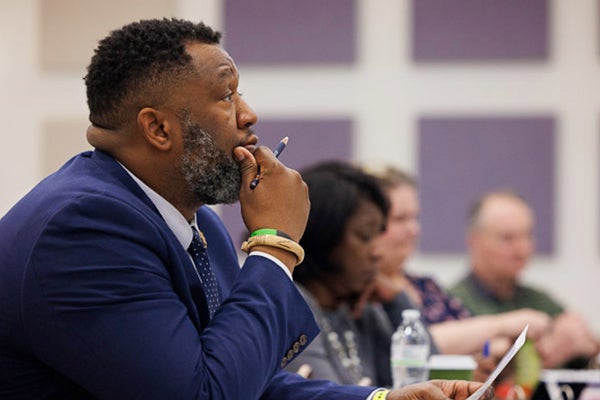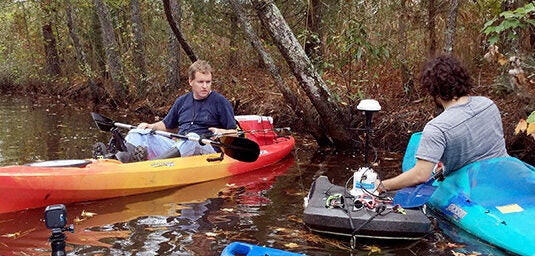ECU earns prestigious community engagement designation
East Carolina University has earned the prestigious 2024 Carnegie Community Engagement Classification from the American Council on Education (ACE) and the Carnegie Foundation for the Advancement of Teaching. This acknowledgement highlights the work the university and its partners do together in communities across the globe. Only 40 U.S. colleges and universities received the 2024 designation.
“We recognize these institutions for their exceptional commitment to community engagement, and their work to transform knowledge into meaningful action,” said Timothy Knowles, president of the Carnegie Foundation for the Advancement of Teaching. “They exemplify the true spirit of the Carnegie endorsement and the power of serving the public good.”
Dr. Sharon Paynter, acting chief research and engagement officer at ECU, said of the classification, “This designation provides external validation of the university’s resource commitment and infrastructure along with external partnerships that support mutually beneficial community engagement efforts. This is one way ECU delivers on its promises to be a national model for student success, public service and regional transformation.
“Growth in community engagement since our initial classification is evidenced by the number of partnerships and the grant support that includes community engagement efforts. In fiscal year 2023 alone, more than $25 million in grants and contracts was received by the university to support 142 projects involving community partnerships,” she said.
ECU first earned the Carnegie Community Engagement Classification in 2008 and has held it continuously since that time. The reclassification is valid for the next six years.
Above and Beyond

Municipal leaders from northeastern N.C. counties travelled to ECU for HOME Consortium training. (Photos by Cliff Hollis)
Community engagement goes beyond volunteering time and services. The Carnegie Foundation describes community engagement as the mutually beneficial exchange of knowledge and resources between institutions of higher learning and their larger communities. The purpose of the collaborations is to “enrich scholarship, research and creative activity; enhance curriculum, teaching and learning; prepare educated, engaged citizens; strengthen democratic values and civic responsibility; address critical societal issues; and contribute to the public good.”
Examples of community engagement can be found across ECU’s campus.
Community-based learning and community engaged scholarship have been central to an 18-year relationship between ECU’s medical family therapy faculty and Greene County Health Care, where master’s and doctoral students deliver evidence based integrated behavioral health care services to historically underserved children, adults and families.
In another longtime partnership, the State Employees’ Credit Union Foundation reached out to ECU to help find solutions to address the lack of affordable housing in northeastern North Carolina. An experienced and knowledgeable team led by Paynter, Merrill Flood, Cassie Keel and Dr. Elizabeth Hodge in partnership with area municipalities ultimately formed the Choanoke Area HOME Consortium. This community engaged initiative is part of an important solution for safe and affordable housing.
Through community-engaged research and engineering design, Dr. Randall Etheridge, an associate professor in the department of engineering, collaborated with Hyde County government in addressing flooding and water quality issues facing the community near Lake Mattamuskeet. Etheridge led teams of students in learning about the importance of mutually beneficial relationships with community partners.
Showcasing that community engagement is happening all around the globe, Dr. Jennifer McKinnon with ECU’s maritime studies partnered with the Defense POW/MIA Accounting Agency to lead a team in the recovery of lost service personnel off the coast of Saipan.
The mission incorporated veterans and members from the Task Force Dagger Special Forces Foundation which provides rehabilitative therapy programs to former soldiers and their families.

East Carolina University engineering professor Dr. Randall Etheridge, left, works with a student as they prepare a device that measures water flow and surveys the bottom of a canal at Lake Mattamuskeet. (Contributed)
ECU also has numerous partnerships that help to address unmet health care needs across North Carolina. Addressing the lack of dental services in rural Hyde County, ECU’s School of Dental Medicine developed a service learning center for dental students and dental residents to extend care in historically underserved communities. And Dr. Sy Saeed, professor and chair emeritus in the Department of Psychiatry and Behavioral Medicine and founding director for the Center for Telepsychiatry and e-Behavioral Health, established the North Carolina Statewide Telepsychiatry Program (NC-STeP) to provide virtual mental health services in over 60 rural and underserved counties across the state. The partnerships with both the School of Dental Medicine and NC-STeP are essential to the health and well-being of North Carolinians.
Many other examples of ECU’s commitment to community engagement can be found on ECU’s News Services website.
ECU Community Involvement

ECU’s Dr. Angela Lamson with Greene County Health Care Dr. Sampoorna Velineni, left, and medical assistant Anthony Smith at the James D. Bernstein Community Health Center.
The Carnegie Community Engagement Classification application process was led by Dr. Angela Lamson, interim assistant vice chancellor for economic and community engagement. The team included over 80 faculty, staff and students from departments across campus, and external partners from the communities with which the university engages.
“It was important to showcase through this self-study a variety of ways that ECU engages with community partners through community-based learning, community engaged scholarship and engaged public service,” Lamson said. “This designation is an important recognition for university faculty, staff and students, but also for the community partners who trust the university to collaborate with them.”
ECU’s community engagement efforts have been recognized by the WK Kellogg Foundation, the C. Peter Magrath Award and the Excellence in Community Partner Engagement Award from the Engagement Scholarship Consortium. ECU recently earned the Innovation & Economic Prosperity five-year extension designation from the Association of Public and Land-grant Universities.
More about the Carnegie Foundation reclassification process is available on the Office of Engaged Research website.
Related: https://news.ecu.edu/category/community-engagement/